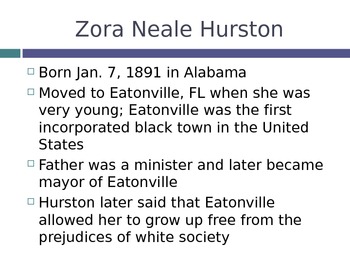

Perhaps because Hurston grew up without a lot of mothering, she became a strong, vigorous, independent girl who did not back off from fights with her brothers and other boys. Hers was a carefree, rough-and-tumble childhood lived as children should live, at least until her mother's sudden death. Incorporated in 1866, this small, all-black town, about five miles north of Orlando, is located on the road that connects Florida Highway 17 and Interstate 4.īiographers, including Robert Hemenway, must rely on Hurston's own story of her childhood as she tells it in Dust Tracks on a Road (1942). Life for Hurston began in Eatonville, the setting of Their Eyes Were Watching God. In between were 69 years of an extraordinary life. For reasons of her own, she gave the public the year 1901. The 1900 census report, however, which lists all members of her family, gives her year of birth as 1891. According to her, she was 9 years old when her mother died.

The date of Hurston's birth is open to question. That setting could easily have been the place that Robert Frost described when he wrote, "Home is the place where, when you have to go there, they have to take you in." Eatonville was that sort of home for Hurston, but she did not ask Eatonville to "take her in." Instead, she took Eatonville into her life and kept it there.

Writing at a time when "local color" was out of fashion as an ingredient of worthy literature, Hurston's writings were rich in local color, and the front porch of Joe Clarke's Eatonville store became Hurston's symbol of hometown security. Throughout her professional career as an anthropologist and writer, as well as her personal life, Hurston never really left the little country town of Eatonville, Florida, and its environs. According to a bit of folk wisdom that Zora Neale Hurston may have known, "You can take the boy out of the country, but you can't take the country out of the boy." In this case, for boy, read girl, and for girl, read Hurston.


 0 kommentar(er)
0 kommentar(er)
